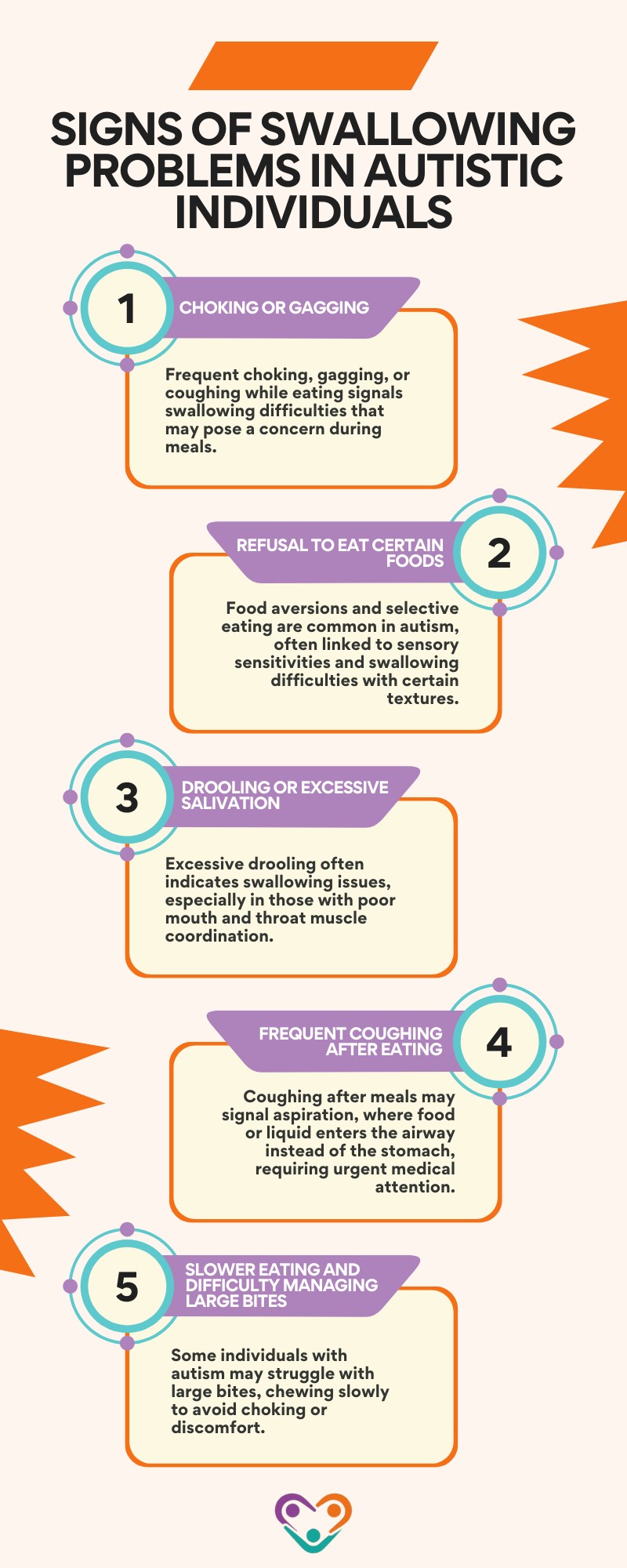Swallowing difficulties, often referred to as dysphagia, can be an overlooked but significant challenge for individuals with autism spectrum disorder. In some cases, this may also lead to issues such as overeating, where difficulty in regulating food intake occurs.
Swallowing problems are not only related to physical issues such as mouth and throat function but can also be linked to sensory sensitivities, motor difficulties, and behavioral challenges commonly associated with autism.
These issues can impact the overall health and quality of life of individuals with autism, making it crucial for caregivers, therapists, and families to recognize, understand, and address them effectively.
Here, we will explore the different types of swallowing issues in autism, their possible causes, and practical strategies to manage and improve swallowing function.
4 Types of Swallowing Issues in Autism
Swallowing issues in autism can manifest in various ways, from difficulties with chewing and food selection to choking or aspiration. The severity and type of issue depend on the individual’s unique sensory, motor, and behavioral traits.
Understanding the specific nature of the problem is crucial for finding appropriate interventions.
That said, here are the different swallowing issues often faced by autistic individuals:
Oral Motor Dysfunction
Oral motor dysfunction refers to difficulties with the muscles in the mouth that control chewing, swallowing, and moving food. Individuals with autism may have challenges with biting, chewing, or even keeping food in their mouths. These issues can result in delayed or incomplete swallowing, leading to choking, gagging, or food refusal.
Sensory Processing Issues
Many individuals with autism have heightened or diminished sensitivity to sensory stimuli, including food textures, temperatures, and smells. This can make certain foods difficult or even intolerable to swallow.
Sensory aversions to specific textures or tastes may result in selective eating, further complicating nutrition and overall health.
Gastroesophageal Reflux Disease (GERD)
While GERD is common among individuals with autism, the symptoms may go unnoticed or be misunderstood due to communication difficulties. Swallowing may be painful, leading to food refusal or a change in eating habits.
Choking and Aspiration
Choking on food and aspiration (food entering the airway or lungs) are serious risks for individuals with swallowing difficulties. These issues are often more prevalent in children with autism who struggle with fine motor coordination, leading to difficulty swallowing safely.
It’s important to note that swallowing problems are sometimes not recognized immediately, which can lead to more severe complications over time.
Signs and Symptoms of Swallowing Problems in Autism
Recognizing the signs and symptoms of swallowing difficulties in individuals with autism is the first step toward managing the condition. Swallowing problems may be subtle, and individuals with communication difficulties may not always be able to articulate their discomfort.
Here are some signs to watch for:

5 Treatment and Management Strategies for Swallowing Issues
Once swallowing issues are identified, it is important to implement strategies to address them. Treatment can vary depending on the underlying cause of the problem and the severity of the symptoms.
Here are some common approaches to managing swallowing issues in autism:
Speech and Language Therapy
Speech therapists, especially those with expertise in feeding and swallowing disorders, can help individuals with autism improve their oral-motor skills. Therapy may include exercises to strengthen the muscles used for chewing and swallowing, along with strategies to address sensory sensitivities related to food textures.
Therapy can also involve teaching the individual how to better coordinate their mouth and throat muscles to ensure a safe and efficient swallowing process.
Sensory Integration Therapy
For individuals with sensory processing challenges, sensory integration therapy can be beneficial. This type of therapy focuses on helping individuals better tolerate and process sensory input, which can include food textures and tastes. Through gradual exposure to different foods, individuals may develop a broader range of food preferences and become more comfortable with eating.
Modified Diets
In some cases, individuals with autism may benefit from a modified diet to reduce the risk of choking or aspiration. Soft, easy-to-swallow foods such as purees or finely chopped meals may be more manageable for those with oral-motor difficulties.
A registered dietitian or nutritionist can work with caregivers to ensure that the diet is nutritionally balanced while still being manageable for the individual.
Posture and Feeding Techniques
Changing feeding techniques and ensuring proper posture during meals can reduce the risk of aspiration and improve swallowing efficiency.
For example, individuals may benefit from sitting upright during meals to encourage proper swallowing. The use of adaptive utensils or specialized cups may also help individuals manage food and liquids more effectively.
Medical Management for GERD or GI Issues
For individuals with autism who experience gastrointestinal issues such as GERD, appropriate medical treatment may be necessary. Medications that reduce stomach acid or treat reflux symptoms can help reduce discomfort during meals and improve the individual’s ability to eat without pain.
Gastrointestinal issues should always be addressed with the guidance of a healthcare provider.
The Key Takeaway
Swallowing issues in autism can be complex and vary greatly from person to person. Early recognition and intervention are key to managing these challenges effectively and ensuring that individuals with autism can maintain proper nutrition and safety during meals.
With the right combination of therapies, support strategies, and lifestyle adjustments, swallowing difficulties can be managed, allowing individuals with autism to lead healthier and more comfortable lives. At Golden Care Therapy, we provide high-quality ABA therapy tailored to meet the unique needs of each individual.
We proudly offer autism services in Georgia, New Jersey, Indiana, New York, and Florida, ensuring families can access compassionate and effective care close to home. Contact us todayto learn how our experienced team can support your loved one’s journey toward improved well-being.



